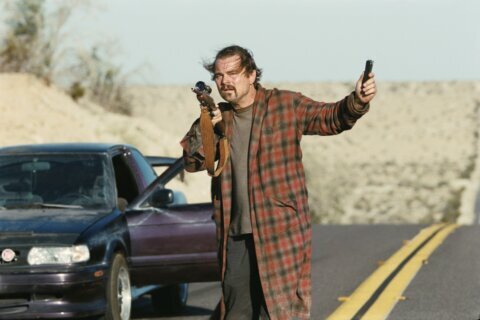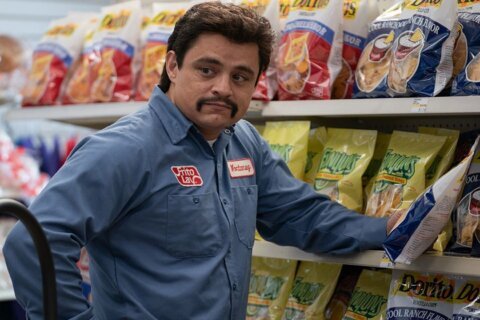Bold. Risky. Electric. Combustible. Self-Aware. Indulgent. Frustrating. Exhausting.
All apply to “Malcolm & Marie,” a film that’s simultaneously gutsy enough to call out its critics in real time, yet so tiresomely talky to alienate viewers as it hits Netflix on Friday.
The story follows rising filmmaker Malcolm (John David Washington) and his recovering addict girlfriend Marie (Zendaya) who return home to their posh Malibu digs for a nightcap at 1 a.m. after the premiere of his directorial debut, sparking celebration, arguments and painful revelations about both them as a couple and as individuals.
Controversy rages over the 12-year age difference between 36-year-old Washington (“BlackKklansman,” “Tenet”) and 24-year-old Disney Channel alum Zendaya (“The Greatest Showman,” “Spider-Man: Homecoming” and an Emmy for HBO’s “Euphoria”).
The age gap will either offend you or it won’t, but the two contrast in other ways.
He is the talkative ego trip, speaking his mind with verbose diatribes; she is the straight woman, stewing with passive aggression. “You’re literally incapable of de-escalating a situation,” Marie says, to which Malcolm replies, “Anytime anything good happens in our lives, you have to find anything to ensure that there is no reason to celebrate.”
It’s a total talkfest of a bickering couple divided by walls in a limited location in the style of Jean-Luc Godard (“Contempt”) and John Cassavetes (“Faces”), recently perfected by Richard Linklater (“Before Midnight”) and Noah Baumbach (“Marriage Story”). Who knew those verbal smackdowns were merely preparing us for “Malcolm & Marie”?
Of course, the biggest influence is Mike Nichols’ “Who’s Afraid of Virginia Woolf?” (1966), the best domestic dispute ever created (shoutout to playwright Edward Albee), only here it’s young lovers still finding themselves, not aging smokers with a dark family secret. You’ll keep waiting for Richard Burton to emerge with an umbrella rifle.
Director Sam Levinson, son of Barry, echoes Nichols’ black-and-white cinematography with an ARRI camera on Kodak Double-X 35mm film stock. It’s all set to a Labyrinth jazz score with diegetic tunes by James Brown and Dionne Warwick commenting on the action: “Get rid of him, get rid of him, do you mean to say you still consider him?”
There’s much to admire about Levinson’s gusto — shooting the film over 14 days in a pandemic, finding creative ways for a limited cast and a remote location, his camera dollying side to side to gaze into windows. It was filmed at California’s Caterpillar House (the characters explain that the producers put them up there for the premiere).
Cinephiles will relish the name drops as Malcolm feels a kinship to William Wyler more than Spike Lee or Barry Jenkins. Critics will hear hard truths: the lack of critics of color, hypocrisy of white savior essays and the laziness of comparing Black directors to other Black directors (to my eyes, Jenkins was always more Wong Kar-Wai than Spike Lee).
No doubt many critics will be put off by such criticism, not wanting to look inward and hoping to bash a film that bashes them. That’s not my problem. In fact, I invite the critique in the same way that Michael Keaton savaged the critic in “Birdman” (2014).
However, Levinson is too cute by half, often becoming the very things he despises.
For instance, he defends himself against the “male gaze,” arguing, “Does the male gaze exist if the filmmaker is gay?” — but then he undercuts himself by keeping Washington in suit and tie, while Zendaya suffers skimpy costume changes. “I’m not topless,” she says. He retorts, “If you were in Chuck E. Cheese they’d throw you out.”
In this moment, Levinson subconsciously admits that he’s a purveyor of the male gaze, not in a symbolic comment on possession (i.e. Alfred Hitchcock), but for the sake of salaciousness (i.e. Paul Verhoeven). There’s no way a female filmmaker, such as Kelly Reichardt, Chloé Zhao or Regina King, would have directed the film this way.
Perhaps this is too critical of Levinson’s intentions. “Cinema doesn’t need to have a message,” Levinson says through Malcolm. “It needs to have a heart and electricity. Morons sap the world of its mystery because they need everything spelled out with ABC blocks, and they’re terrified to embrace anything potentially dangerous.”
Maybe so. Levinson can decry negative reviews just like Malcolm. Maybe that’s his point — a middle finger to Rotten Tomatoes. This thesis would ooze “authenticity” if it were an unknown, starving Black artist, but Levinson is the son of a famous director; Washington, the son of an iconic movie star. They don’t have trouble finding work.
In the end, it’s an electrifying experience that deserves credit for taking risks, but it’s painfully self aware, the kind of stuff that lowbrow viewers deem “artsy” and highbrow critics deem “artifice.” When Malcolm calls film critics “pedantic” within his own pedantic speech, we want to echo Marie: “Stop. It makes you sound like an a******.”









